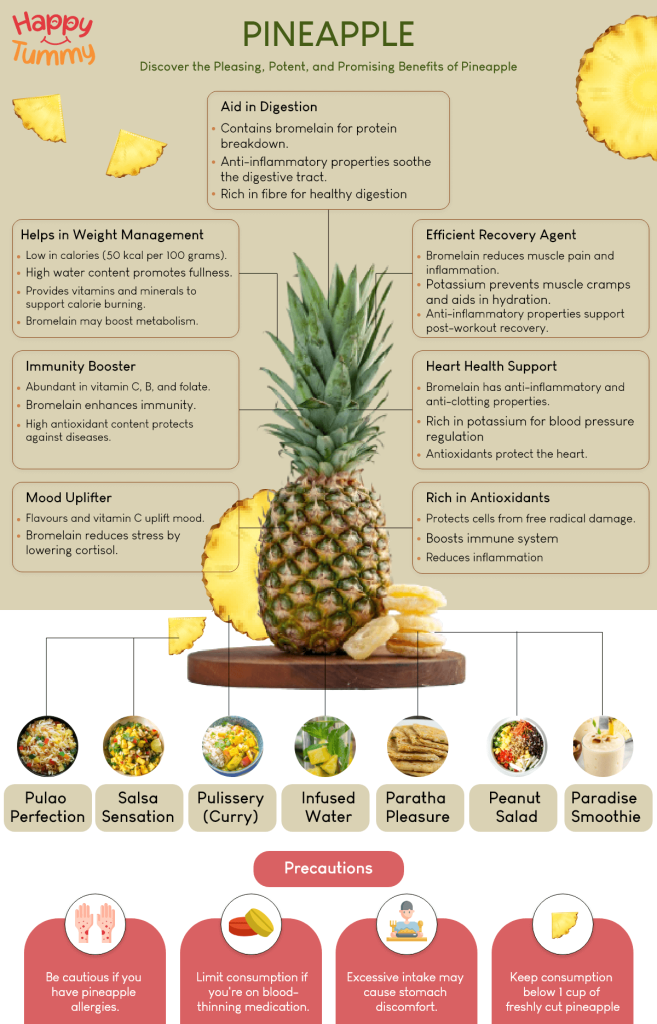Health Benefits of Pineapples
Pineapples ripening on a plantation. These tropical fruits are not only sweet and juicy but also packed with essential nutrients and beneficial compounds. Pineapple ( Ananas comosus ) is rich in vitamin C, manganese, and a unique enzyme called bromelain, all of which contribute to its healthful propertieslivescience.com. This fruit has been associated with improved digestion, enhanced immunity, and anti-inflammatory effects, among other advantageslivescience.com.
Nutritional Content (Vitamins, Minerals & Fiber)
Pineapple is a nutrient-dense fruit that provides a wide array of vitamins and minerals in a low-calorie package. One cup of pineapple (~165 g) contains only about 75–82 calorieshealthline.com, yet it delivers significant amounts of several essential nutrients:
Vitamin C: About one-third of the recommended daily intake per cup. Vitamin C supports tissue growth and repair, boosts immune function, and acts as an antioxidant to protect cellshealth.clevelandclinic.org. (One cup of pineapple provides ~79 mg vitamin C, roughly 88% of the Daily Valuehealthline.com.)
Manganese: Over 100% of the daily requirement in one cup. Manganese is an essential trace mineral that aids in bone formation, metabolism, and immune responsehealth.clevelandclinic.org. (Pineapple is one of the best dietary sources of manganesehealth.clevelandclinic.org.)
Dietary Fiber: Nearly 10% of daily fiber needs per cup. The fiber in pineapple supports a healthy gut and regular digestion, and it helps you feel full, which can prevent overeatinghealth.clevelandclinic.org.
B Vitamins: A modest but varied supply of B vitamins, including thiamin (B1), niacin (B3), vitamin B6, and folatehealth.clevelandclinic.org. These vitamins help the body convert food into energy and are important for forming new red blood cells.
Other Minerals: Pineapple also provides minerals like copper, potassium, and magnesium in smaller amountshealth.clevelandclinic.org. Copper, for instance, is about 20% of the Daily Value per cup and is important for iron metabolism and immune healthhealthline.com.
In addition to vitamins and minerals, pineapples contain beneficial plant compounds. Notably, they are a good source of antioxidants (such as flavonoids and phenolic acids) which help neutralize harmful free radicals in the bodyhealthline.com. Many of pineapple’s antioxidants are “bound,” meaning they may have longer-lasting effects in reducing oxidative stresshealthline.com. This rich nutritional profile makes pineapple a valuable addition to a healthy diet.
Digestive Health Effects (Role of Bromelain)
Pineapple has long been used to support digestive health. One reason is its high fiber content, which promotes regular bowel movements and nourishes beneficial gut bacterialivescience.com. Eating fiber-rich fruits like pineapple can help prevent constipation and maintain a healthy digestive tract.
Another unique digestive aid in pineapple is bromelain, a group of proteolytic (protein-digesting) enzymes. Bromelain helps break down protein foods into smaller peptides and amino acids, making them easier to digest and absorb in the small intestinelivescience.com. In fact, pineapple or its juice is often used as a natural meat tenderizer due to these protein-breaking enzymes. By aiding protein digestion, bromelain may help reduce indigestion, bloating, or stomach upset after a high-protein meallivescience.com.
Research is still ongoing, but bromelain is thought to have therapeutic potential for digestive disorders. Some studies have explored bromelain supplements for conditions like inflammatory bowel disease or for reducing post-meal discomfort, though more evidence is needed. Nonetheless, consuming pineapple provides a natural source of this enzyme. Combined with its fiber, the bromelain in pineapple makes it a digestive-friendly fruit – many people find that a serving of pineapple after a heavy meal can serve as a light dessert that also aids digestionhealth.clevelandclinic.org.
Immune System Support
Pineapple can give your immune system a boost, mainly due to its high vitamin C content and other supportive nutrients. Vitamin C is crucial for immune cell function and protects the body against pathogens. A single cup of pineapple provides a large portion of your daily vitamin C needs, helping strengthen the immune defenses against common illnesseshealth.clevelandclinic.org. Adequate vitamin C intake is associated with improved wound healing and enhanced resistance to infectionshealth.clevelandclinic.org.
Beyond vitamin C, pineapples contain various antioxidants and nutrients that contribute to immune health. Manganese, for example, is involved in antioxidant enzymes that protect immune cells from oxidative stresslivescience.com. Pineapple also offers vitamin B6 and copper, which play roles in maintaining a healthy immune response.
Interestingly, the bromelain in pineapple may have immunomodulatory effects. Some research suggests that bromelain, along with pineapple’s other compounds, can collectively improve immunity and reduce inflammationhealthline.com. Bromelain has been studied as an adjunct therapy for respiratory ailments; for instance, it may help reduce excessive mucus in the nose and throat. One study noted that a mixture of pineapple (with honey) helped relieve coughs and dissolve mucus in patients suffering from sinusitis or coldslivescience.com. People with allergies or sinus issues sometimes consume pineapple regularly for its potential to reduce nasal swelling and congestion over timelivescience.com. While more research is needed, these observations underscore pineapple’s value as an immune-supportive food.
Anti-Inflammatory and Antioxidant Properties
One of pineapple’s standout benefits is its anti-inflammatory effect, largely attributed to bromelain. Bromelain has notable anti-inflammatory and analgesic (pain-relieving) propertiesverywellfit.com. It has been used (often in supplement form) to reduce swelling, bruising, and pain after injuries or surgerieshealthline.comhealthline.com. In Europe, bromelain is even utilized to help treat inflammation from sinusitis and to support wound healing after dental or skin proceduresverywellfit.com. For individuals with arthritis, particularly osteoarthritis, bromelain may provide relief: studies have found bromelain supplements can alleviate joint pain and inflammation comparable to some anti-inflammatory medicationshealth.clevelandclinic.orghealthline.com. Eating pineapple won’t cure inflammatory conditions outright, but as a dietary addition it can contribute to an overall anti-inflammatory diet.
In addition to bromelain, pineapple is rich in antioxidants, which help combat oxidative stress in the body. Oxidative stress – an imbalance caused by excess free radicals – is linked to aging and chronic diseases (like heart disease and cancer). Pineapple’s vitamin C is a potent water-soluble antioxidant that scavenges free radicals and reduces cellular damagelivescience.com. Pineapples also contain flavonoids and phenolic compounds that further contribute to antioxidant defensehealthline.com. These antioxidants support overall health by protecting tissues from inflammation and damage. For example, diets high in antioxidant-rich fruits like pineapple are associated with a lower risk of conditions such as heart disease, macular degeneration, and certain cancerslivescience.comhealthline.com. Some research specifically suggests that pineapple (and bromelain) may help inhibit tumor growth or reduce cancer risk by minimizing inflammation and oxidative stress, though this is based on preliminary studies and animal modelshealthline.comhealth.clevelandclinic.org.
In summary, the combination of bromelain’s anti-inflammatory action and pineapple’s broad antioxidant profile makes this fruit particularly helpful in fighting chronic inflammation and supporting the body’s natural defense against oxidative damage.
Impact on Weight Management and Metabolism
Incorporating pineapple into your diet may be beneficial for weight management. First, pineapple is relatively low in calories for its volume: a one-cup serving has around 75–82 calories and no fat or cholesterolhealth.clevelandclinic.orghealthline.com. Replacing high-calorie desserts or snacks with naturally sweet pineapple can satisfy cravings for sweetness with far fewer calories, potentially helping with weight control. Pineapple’s high water content and fibrous nature also contribute to a feeling of fullness. The ~2 grams of fiber per cup slow down digestion and promote satiety, which can prevent overeating and aid in appetite controlhealth.clevelandclinic.org.
Pineapple provides certain nutrients that support metabolism. Notably, it is rich in manganese, supplying over 100% of the daily value in a cuphealth.clevelandclinic.org. Manganese is a co-factor for enzymes involved in energy production and metabolism of carbohydrates and fatshealth.clevelandclinic.org. Pineapple also contains B vitamins (like thiamin and B6) that help the body convert food into usable energyhealth.clevelandclinic.org. Together, these nutrients ensure that your metabolism runs efficiently, which is important when you are trying to manage weight.
There are also claims about pineapple’s enzymes aiding weight loss. Bromelain has been suggested (in popular media and some studies) to possibly enhance fat burning or absorption. Animal research lends some support: for example, one study found that rats fed a high-fat diet gained less weight when they also consumed pineapple extract, hinting that pineapple might influence fat metabolismhealth.clevelandclinic.orghealthline.com. Additionally, a test-tube study indicated bromelain could affect fat cells in a way that might combat obesity (though this is far from conclusive for humans). However, it’s important to note that human evidence for pineapple’s direct fat-burning effects is limited – the promising results are mostly from animal studies or very high-dose bromelain supplementshealth.clevelandclinic.org. Health experts caution that pineapple is not a magic weight-loss cure, but it can certainly be part of a weight-conscious diethealth.clevelandclinic.org. Its real strength lies in being a nutritious, low-calorie food that can replace sugary treats and keep you satisfied. In summary, pineapple can be considered a figure-friendly fruit: it supports metabolism through its nutrient content and helps control hunger, both of which are helpful for weight management.
Potential Risks, Side Effects, and Allergies
Pineapple is generally safe and healthy for most people when eaten in moderation, but there are a few potential risks and side effects to be aware of:
Mouth Irritation: Fresh pineapple contains high levels of bromelain, which, while beneficial, is also a protease that can “tenderize” meat – and the sensitive tissues of your mouth. Eating a lot of raw pineapple at once can cause a temporary burning or tingling sensation on the tongue, lips, and cheekslivescience.com. This can feel like soreness or tenderness of the mouth. Fortunately, these effects are usually short-lived and should resolve within a few hours. Drinking water or pairing pineapple with other foods can help rinse the enzyme away. (If mouth itching or burning is severe or persists, it could indicate an allergic reaction rather than just bromelain’s effecthealthline.com.)
Allergic Reactions: True pineapple allergy is uncommon, but it can occur. Pineapple allergy may cause symptoms like hives, rash, swelling of the mouth or throat, difficulty breathing, or even anaphylaxis in severe caseslivescience.comverywellfit.com. People who have other fruit allergies (like latex-fruit syndrome or pollen-food allergies) could potentially react to pineapple due to cross-reactivityverywellfit.com. If you experience any signs of an allergic reaction after eating pineapple, seek medical attention. Allergists note that bromelain itself can be an allergen for some individuals, so concentrated bromelain supplements might pose a risk to those sensitivehealthline.com.
Digestive Upset: While pineapple in normal food amounts aids digestion, overconsumption can cause gastrointestinal distress. Pineapple is high in vitamin C, and consuming extremely large quantities of vitamin C-rich fruit may lead to diarrhea, nausea, or abdominal pain in some peoplelivescience.com. Similarly, taking in too much bromelain (via excessive pineapple or supplements) could cause vomiting or diarrhea as welllivescience.com. Moderation is key – a cup or two of pineapple is a healthy serving, but eating several whole pineapples in a day would likely irritate your digestive system.
Medication Interactions: Bromelain can interact with certain medications. It has mild blood-thinning effects and may amplify the effect of blood thinner medications like warfarin, or anti-platelet drugs, potentially increasing bleeding riskverywellfit.comlivescience.com. It might also interact with sedatives, anticonvulsants, or certain antibiotics (like amoxicillin or tetracyclines), affecting how these drugs are absorbed or metabolizedverywellfit.comlivescience.com. If you are on prescription medications – especially blood thinners or sedatives – it’s wise to ask your healthcare provider about any need to limit pineapple or bromelain supplementsverywellfit.com.
Unripe Pineapple Toxicity: Avoid eating unripe pineapple or drinking unripe pineapple juice. Unripe pineapple is potentially toxic to humans and can cause severe vomiting and diarrhealivescience.com. The fruit should be properly ripened (golden-yellow flesh, sweet aroma) before consumption. Likewise, the central core of the pineapple is very fibrous; eating it in large amounts isn’t toxic, but it could form fiber balls (bezoars) in rare instances, so it’s usually discarded or eaten in small quantitieslivescience.com.
High Sugar Content: Pineapple is a fairly sugary fruit. One cup of pineapple contains about 16 grams of natural sugarshealthline.com, which is higher than some fruits (for comparison, 1 cup of strawberries has ~8g). While this natural sugar comes with fiber, vitamins, and minerals, those monitoring their blood sugar (such as people with diabetes) should be mindful of portion sizes. Enjoying pineapple in moderation as part of a balanced meal (rather than as a standalone large serving) can help moderate its glycemic impact.
Overall, for most people, the health benefits of pineapple far outweigh the risks. Simply exercise common sense: enjoy pineapple in reasonable portions, and if you notice any adverse reactions, moderate your intake or consult a healthcare professional. When eaten as part of a varied diet, pineapple can be a delicious way to obtain valuable nutrients and health benefits.
Sources: High-quality sources were used to compile this overview, including nutritional data from the USDA and health information from medical organizations and peer-reviewed researchhealthline.comhealthline.comlivescience.com. These references highlight pineapple’s rich nutrient profile and its studied health effects, as well as caution about potential risks.
Sources
🌿 Explore More Natural Remedies
Click here to read more articles




